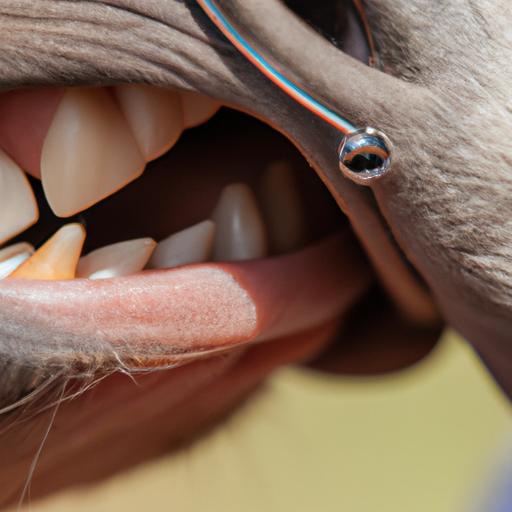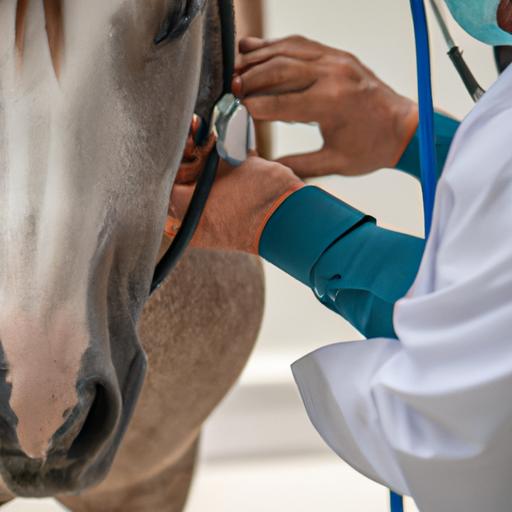Ensure your horse’s well-being with regular health check-ups. Early detection, improved performance, and long-term cost-effectiveness. Learn more about horse health checks.
Introduction

As horse enthusiasts, we understand the deep bond we share with our equine companions. We strive to provide the best care possible, ensuring they lead healthy and fulfilling lives. One crucial aspect of horse care that often gets overlooked is regular horse health check-ups. These check-ups play a vital role in safeguarding your horse’s well-being and preventing potential health complications down the line.
Horses, like any living beings, are susceptible to various health issues. From common ailments to more severe conditions, their health can impact their overall performance and quality of life. By staying proactive and scheduling regular health check-ups, you can take proactive measures to address any concerns promptly.
In this article, we will explore the importance of regular horse health check-ups and provide you with a brief overview of common horse health issues. By understanding the significance of these check-ups and the potential health risks your horse may face, you can take necessary steps to ensure their long-term well-being.
So, let’s delve into the world of horse health checks and equip ourselves with the knowledge needed to be proactive caretakers for our beloved equine companions.
Understanding Horse Health Check-ups
Definition and Purpose of Horse Health Check-ups
When we talk about horse health check-ups, we refer to comprehensive examinations conducted by veterinarians to assess the overall well-being of your horse. These check-ups involve various components, including physical examinations, dental assessments, vaccinations, parasite control, nutrition evaluation, and hoof care. The purpose of these check-ups is to detect any potential health issues early on, prevent diseases, and ensure your horse’s optimal health and performance.
Frequency and Timing of Check-ups
The frequency of horse health check-ups may vary depending on factors such as age, breed, and individual health history. Generally, it is recommended to schedule check-ups annually for healthy adult horses. However, for foals, younger horses, or those with pre-existing health conditions, more frequent check-ups may be necessary. Regular check-ups allow veterinarians to track your horse’s health over time, identify any changes, and intervene promptly if needed.
Timing is crucial when it comes to horse health check-ups. Engaging in preventative care is far more effective and affordable than dealing with a full-blown health crisis. By adhering to a regular schedule of check-ups, you can catch potential issues early on, preventing them from escalating into more significant problems.
Role of Veterinarians in Conducting Check-ups
Veterinarians play a vital role in conducting horse health check-ups. These professionals possess the expertise and experience to thoroughly examine your horse and interpret any signs or symptoms of potential health issues. They have the knowledge to conduct physical examinations, dental assessments, administer vaccinations, recommend parasite control measures, evaluate nutrition, and provide guidance on hoof care.
By relying on the expertise of veterinarians, you can ensure that your horse receives the highest standard of care. These professionals can offer tailored advice based on your horse’s specific needs, providing you with peace of mind and reassurance that your equine companion is in good hands.
Now that we understand the fundamentals of horse health check-ups, let’s delve deeper into the common health issues that horses may face in Section
Common Health Issues in Horses
Horses, like any other animals, can experience a range of health issues. Being aware of these common problems and their potential impact on your horse’s well-being is essential for early detection and timely intervention. Let’s take a closer look at some of the most prevalent horse health problems:
1. Overview of Common Horse Health Problems
Horses can encounter a variety of health issues, including respiratory problems, digestive disorders, lameness, skin conditions, and dental problems. Respiratory issues such as equine asthma can cause coughing, nasal discharge, and difficulty breathing. Digestive disorders like colic, which is characterized by abdominal pain, can be life-threatening if not addressed promptly. Lameness, often caused by musculoskeletal problems, can result in decreased mobility and performance. Skin conditions, such as rain rot and sweet itch, can cause discomfort and affect the horse’s overall well-being. Dental problems, including uneven wear and dental decay, can impact their ability to eat and maintain proper nutrition.
2. Identifying Signs and Symptoms
Recognizing the signs and symptoms of common horse health problems is crucial for early intervention. Keep an eye out for indicators such as coughing, nasal discharge, difficulty swallowing, weight loss, changes in behavior, lameness or stiffness, skin lesions, hair loss, and abnormal feces. Changes in appetite, water consumption, or coat condition can also be red flags. Regularly monitoring your horse’s vital signs, such as temperature, heart rate, and respiratory rate, can help identify any underlying health issues.
3. Impact of Untreated Health Issues on Horse’s Well-being
Neglecting to address and treat common health problems in horses can have severe consequences. Untreated respiratory issues can lead to chronic lung damage, compromising the horse’s overall performance. Digestive disorders, if left untreated, can result in intestinal blockages or twisted intestines, which may require surgical intervention. Untreated lameness can lead to long-term joint damage and decreased athletic ability. Skin conditions, if not managed, can cause discomfort, infections, and potential scarring. Neglected dental problems can lead to difficulty chewing, weight loss, and nutritional deficiencies.
By being aware of these common health issues, knowing how to identify signs and symptoms, and understanding the potential consequences of untreated conditions, you can take proactive steps to ensure your horse’s well-being and maintain their overall health and happiness.
Components of a Horse Health Check-up
Taking your horse for a regular health check-up involves several essential components that contribute to their overall well-being. Let’s explore each aspect in detail:
1. Physical Examination: Assessing Vital Signs, Body Condition, and Overall Appearance
During a horse health check-up, a veterinarian will conduct a thorough physical examination. This includes assessing vital signs such as heart rate, respiratory rate, and temperature. Additionally, they will evaluate the horse’s body condition, looking for any signs of weight loss, muscle atrophy, or abnormal lumps. The overall appearance of the horse, including coat quality and eye clarity, is also observed.
2. Dental Examination: Importance of Dental Health in Horses
Dental health is crucial for horses’ overall well-being, as they rely on their teeth for chewing and grinding food properly. A dental examination involves checking for any abnormalities, such as sharp points, hooks, or uneven wear. Regular dental care, including floating, ensures proper alignment and prevents discomfort or difficulty when eating.
3. Vaccinations: Understanding the Vaccination Schedule and its Role in Preventing Diseases
Vaccinations are a vital part of horse health check-ups as they protect against various infectious diseases. It is essential to understand the recommended vaccination schedule and ensure your horse is up to date. Common vaccinations include those for tetanus, influenza, rhinopneumonitis, and West Nile virus. By staying current on vaccinations, you can significantly reduce the risk of your horse contracting preventable diseases.
4. Parasite Control: Importance of Regular Deworming and Fecal Exams
Parasite control is crucial for maintaining your horse’s health. Regular deworming, based on a veterinarian’s recommendation, helps eliminate internal parasites. Fecal exams are also conducted to identify specific parasites and tailor the deworming approach accordingly. By managing parasites effectively, you can prevent potential health complications and ensure your horse’s optimal well-being.
5. Nutrition Assessment: Evaluating the Horse’s Diet and Ensuring Proper Nutrition
A thorough nutrition assessment is an essential aspect of a horse health check-up. Evaluating the horse’s diet helps ensure they receive adequate nutrients for their specific needs. The veterinarian will analyze the diet, including forage quality, grain intake, and supplementation. Based on the assessment, appropriate adjustments can be made to optimize your horse’s nutrition and support their overall health.
6. Hoof Care: Discussing the Significance of Regular Trimming and Shoeing
Hoof care is crucial for maintaining a horse’s soundness and preventing lameness. Regular trimming ensures proper hoof balance and promotes healthy hoof growth. For horses that require additional support, such as those involved in rigorous activities, shoeing may be necessary. Proper hoof care helps prevent injuries, discomfort, and long-term hoof-related issues.
By prioritizing these components during horse health check-ups, you can proactively address any potential issues, promote your horse’s well-being, and enhance their overall quality of life.
Conclusion
Regular horse health check-ups are not just a responsibility, but a necessity for every horse owner. By prioritizing these check-ups, you can ensure the well-being of your equine companion and provide them with the best possible care.
Through early detection and prevention of health problems, regular check-ups enable you to address any issues before they escalate into more serious conditions. This proactive approach can save your horse from unnecessary suffering and potentially costly treatments.
Moreover, investing in regular health check-ups contributes to improved overall health and performance for your horse. By identifying and addressing any health concerns promptly, you can optimize their physical well-being, allowing them to thrive in their activities, whether it be riding, competing, or simply enjoying their daily routines.
Additionally, regular check-ups offer long-term cost-effectiveness. By catching and treating potential health issues early on, you can prevent more extensive and expensive treatments in the future. This not only benefits your horse but also your wallet.
As responsible horse owners, let’s make a commitment to prioritize our horse’s health by scheduling regular check-ups with a trusted veterinarian. By doing so, we can ensure that our equine companions lead healthy, vibrant lives filled with joy and vitality.
Remember, at Horsemasterypro.com, we are committed to providing you with valuable resources and information to enhance your horse’s well-being. Stay tuned for more insightful articles and expert guidance to help you become the best horse guardian you can be.
Brought to you by Horsemasterypro.com


